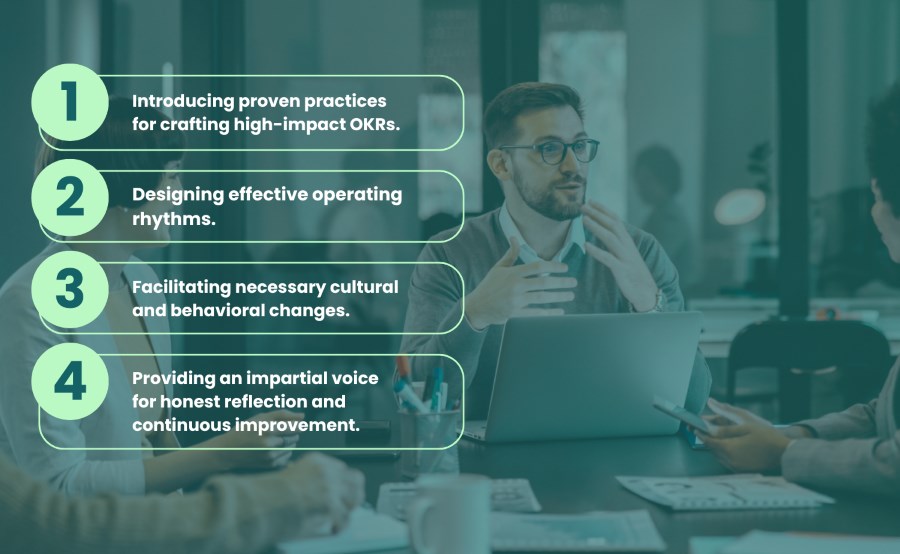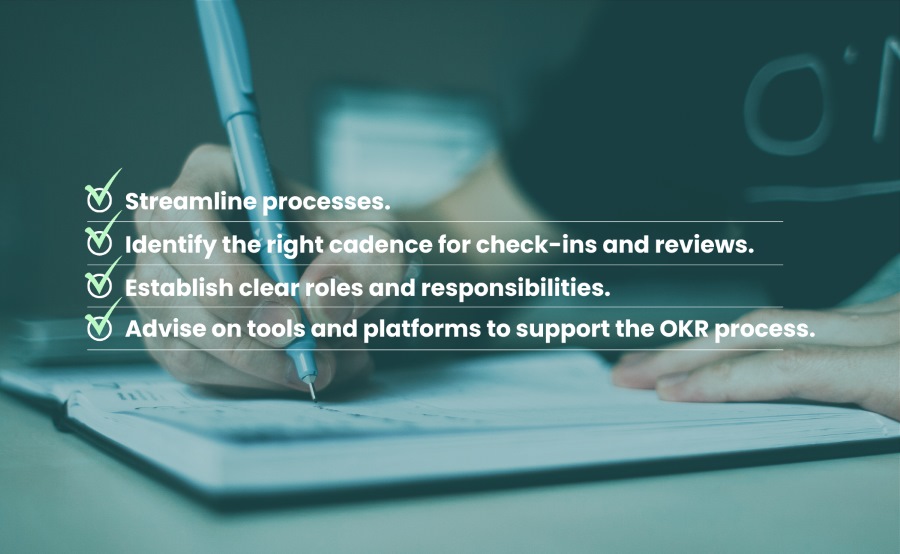Objectives and Key Results (OKRs) have emerged as a powerful framework for setting goals, driving alignment, and accelerating results. However, implementing OKRs effectively is not a simple task. It requires a significant shift in mindset, culture, and practices – a shift that can be challenging to navigate from inside the organization. Leaders often find themselves grappling with questions like:
- Are we setting the right objectives?
- How do we cascade OKRs effectively?
- How do we ensure alignment and maintain focus?
- How do we use OKRs to drive meaningful change?

Takeaway: Successfully implementing OKRs demands a transformation in mindset, culture, and practices.
The Role of an External OKR Consultant
This is where the power of an external OKR consultant comes into play. An experienced consultant brings an outside perspective, unencumbered by the organization’s historical habits and assumptions. They’ve seen OKRs unfold across different industries, company sizes, and cultures, allowing them to quickly spot improvement opportunities. They can help leadership teams critically assess their approach to strategic priorities by:
- Introducing proven practices for crafting high-impact OKRs.
- Designing effective operating rhythms.
- Facilitating necessary cultural and behavioral changes.
- Providing an impartial voice for honest reflection and continuous improvement.

Key Insight: Consultants offer an invaluable outside perspective to challenge assumptions and guide strategic focus.
The Value of External Expertise in OKR Definition
One of the first challenges organizations face when adopting OKRs is defining the right objectives and key results. This is a critical step, as poorly defined OKRs can lead to confusion, misalignment, and wasted effort. An external OKR consultant brings a wealth of experience in facilitating OKR definition workshops, guiding executive teams to identify the strategic priorities where the organization needs to focus its efforts for a given period.
Pro Tip: Well-crafted OKRs are specific, measurable, and tightly aligned with organizational strategy.
Consultants help teams have conversations and make decisions in a different way. They ask probing questions, challenge assumptions, and ensure that the resulting OKRs are specific, measurable, and aligned with the organization’s overall strategy. This outside perspective and structured approach can be invaluable in setting the foundation for a successful OKR program.
Designing an Effective OKR Deployment Strategy
Once the OKRs are defined, the next challenge is developing a clear and effective deployment strategy. This is where an external consultant can really shine, leveraging their experience to create a tailored implementation roadmap that avoids common pitfalls and unnecessary complexity.
Get Started: Looking to streamline your OKR deployment? Download the Strategy Execution Playbook for expert insights and practical steps.

A consultant will:
- Streamline processes.
- Identify the right cadence for check-ins and reviews.
- Establish clear roles and responsibilities.
- Advise on tools and platforms to support the OKR process.

By providing this strategic guidance, consultants help organizations set themselves up for success from the start.
Supporting OKR Implementation and Execution
As organizations begin to implement OKRs, they often encounter challenges in terms of adoption, engagement, and consistency. External consultants can provide invaluable support during this critical phase, offering targeted training, coaching, and troubleshooting.
Targeted Training for All Roles
One key area where consultants add value is in providing targeted training for the various roles involved in the OKR process. They offer role-specific training programs tailored to the needs of executives, managers, and individual contributors.
For example:
- Executives learn about setting strategic priorities and fostering transparency.
- Champions focus on team-level OKRs and coaching their members.
- Contributors understand crafting and tracking key results.

Practical Tool: Ready to implement OKRs effectively? Use the Checklist to Implement OKRs to guide your process and ensure success. This outside perspective and structured approach can be invaluable in setting the foundation for a successful OKR program.
Ongoing Coaching and Support
In addition to formal training, consultants provide opportunities for ongoing coaching and support. This allows leaders and teams to receive guidance as they apply their new knowledge and skills in practice. Consultants can join check-in meetings, provide feedback on OKR quality, and help teams course-correct when needed.
By providing targeted, role-specific training and ongoing coaching, consultants empower leaders and teams to effectively implement and sustain OKRs over the long term.
Building Scalable Structures for Long-Term Success
For OKRs to truly transform an organization, the methodology needs to be scaled beyond a single team or department. This is where external consultants can play a critical role, helping to build scalable structures and capabilities that enable broad-based adoption.
Building a Community of Champions
One powerful approach that consultants often recommend is building a community of internal OKR champions. These are individuals from across the organization who receive in-depth training on OKRs and then serve as local experts and advocates within their teams.
Action Step: Build a sustainable OKR practice by developing champions within your organization. Access the Community of Champions Playbook to get started today!
By investing in this internal capability-building, organizations can create a self-sustaining engine for OKR adoption.
Facilitating Reflection and Continuous Improvement
OKRs are not a set-it-and-forget-it methodology. To realize their full potential, organizations need to regularly reflect on their OKR process and continuously improve. External consultants play a valuable role here as well, facilitating structured retrospectives at the end of each OKR cycle.
In these retrospectives, consultants guide teams to:
- Reflect on successes and challenges.
- Identify actionable improvements.
- Share insights and best practices.

Key Takeaway: Continuous improvement ensures OKRs remain relevant and impactful as your business evolves.
Conclusion
Implementing OKRs is a process of learning, adaptation, and growth. While the destination—a focused, aligned, and agile organization—is highly appealing, the path to get there can be challenging to navigate. This is where an external OKR consultant can be an invaluable partner.
By providing expert guidance, targeted support, and an outside perspective at each stage of the journey, consultants help organizations accelerate their progress and avoid costly missteps. They build capabilities, create scalable structures, and foster a culture of continuous improvement.
Starting working with OKRs is not always an easy one, but with the right partner by your side, it can be a transformative one.
OKRmentors is formed by a community of world-class experts in strategy execution, specialized in guiding organizations like yours. Book a free consultation today to discover how our consultants can help you achieve strategic clarity and execution excellence.


